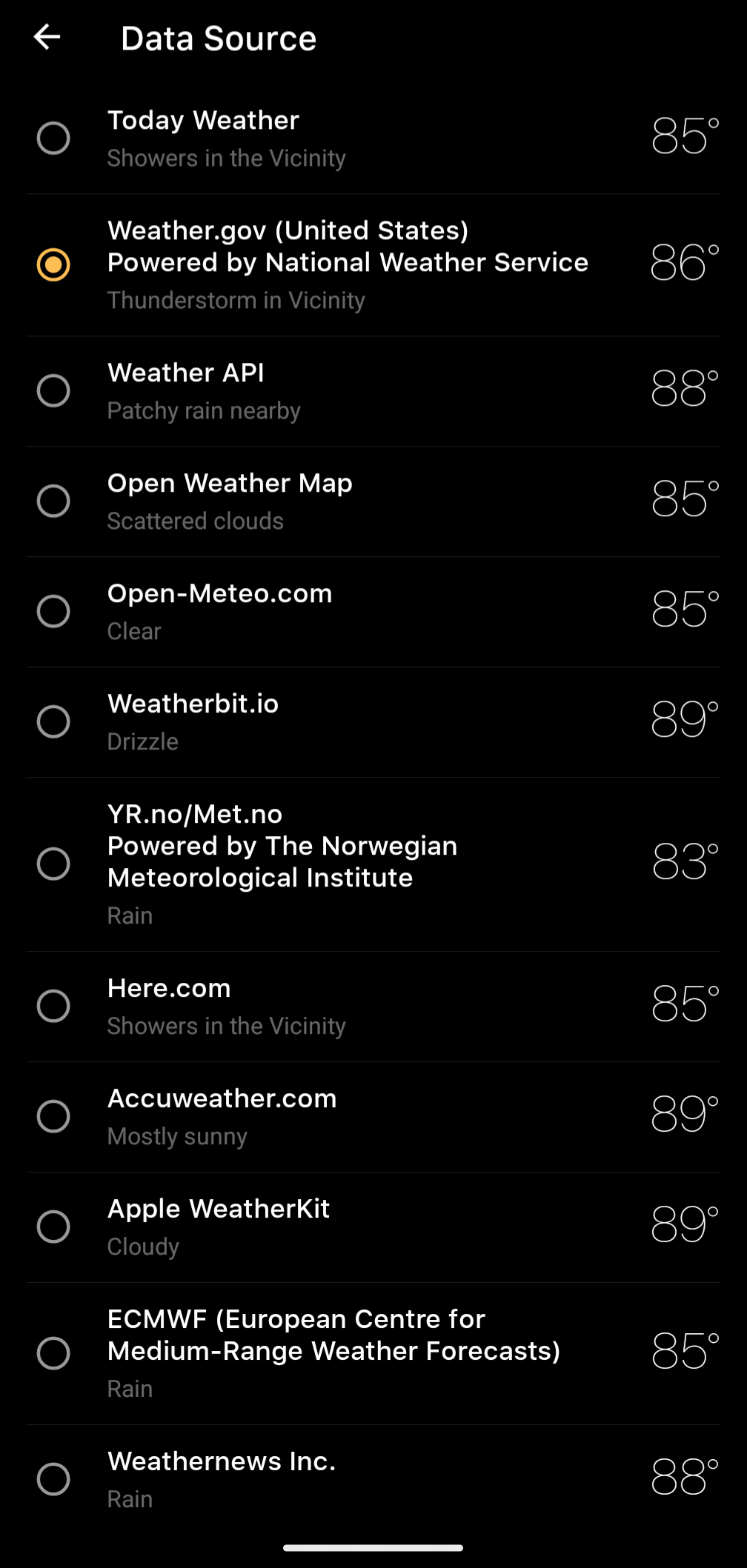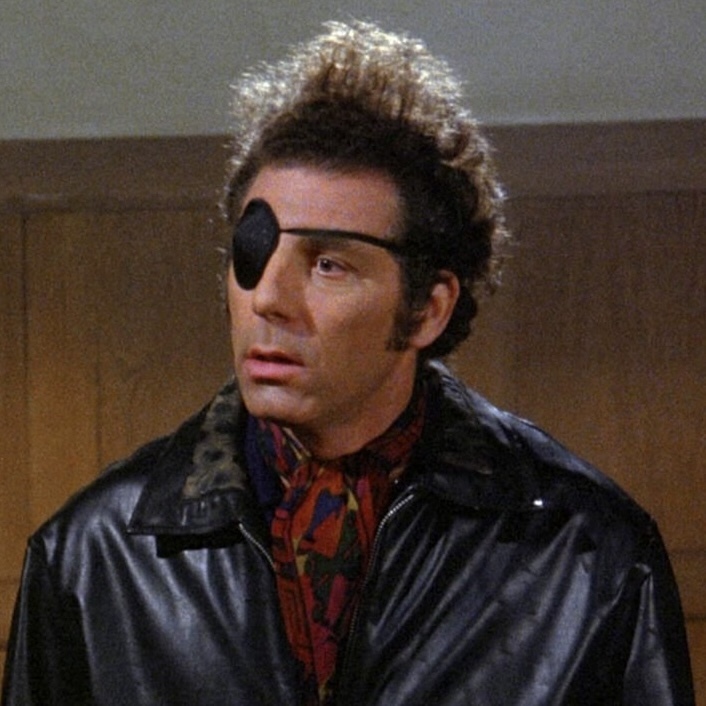I understand that weather on TV can’t be hyperlocally accurate. But a weather app on my phone has my exact GPS coordinates. Why can’t it tell me exactly when a rain cloud will be passing over my location?
It’s gotten to the point where I just use precipitation maps to figure out my rain chances for the day.
The hourly forecast is mostly useless because it’s not a chance % but a % of the area that will be raining.
Weather apps don’t do real time analytics, but show you the forecast some nearby weather station has calculated. Whether that’s based on current data or a couple hours ago depends on the exact provider they use. And hardly anyone of those are done by actual humans, it’s aggregated statistics.
If you look at precipitation maps, you are doing that forecast by yourself based on cloud movements and local knowledge, something no machine-generated forecast can do as good.
Plus, there’s usually one weather station covering a large area, so hyperaccurate predictions would have to be made just for you - which simply costs to much.
Nearby is so highly dependent on where exactly those are located, and what they’re connected to (some are handled by local volunteers that have hardware that reports periodically as opposed to being operated by an agency directly). Various apps don’t all connect to the same data sources.
Official reporting locations may not actually be close to you and weather can be highly localized. A mile can make a massive difference in weather in some regions, and the official recording location for the city is 10 miles away.
Even very close data stations are limited. I regularly get incorrect rainstorm notifications from data gathered from a couple miles away.
Sma here. I have a buddy that’s a half mile away and we regularly don’t have the same rain. It’ll be pouring here and dry as a bone there.
I once experienced a storm where, for a very brief time, my front yard was experiencing a torrential downpour and my back yard was dry as a bone.
My house was not that big - maybe 1700-1800sq ft - and our lot size was less than a quarter acre. Blew my mind. (Obviously storms have edges. It was still weird.)
I had family from out of town calling me once because the nstional news was reporting the entire area was hit with heavy storms and tornados. The city isn’t even more then 15 minutes down the interstate, but we didn’t get a single drop of rain.
Sounds like the system is just stuck on old tech. If I can tell that rain will reach my area from a precipitation radar map then I’m fairly certain an ML based system can do this too.
I suppose there’s just no money in it.
I am a pilot and flight instructor. I took a full year of meteorology at ERAU. Most weather forecast products presented to the general public are completely worthless, and we really should run “AccuWeather” out of business.
The temperature number they show you for what it is “now” was probably taken by the AWOS at the closest municipal airport to your location. If you’ve ever noticed like a car GPS reporting weather from three towns over and not the one you’re in right now, it’s because the town you’re in right now doesn’t have a nearby airport or it doesn’t have an AWOS.
10-day forecasts are generated by tarot cards and have no basis in reality. Actual aviation weather forecasts seldom reach out beyond 24 hours.
Your best bet for getting a complete understanding of the weather is to start by looking at the GOES satellite imagery, ie actually look at the Earth from geosynchronous orbit and look at the clouds. You know those maps with the blue lines with triangles on them and red lines with half circles and big blue Hs and big red Ls? Those are called Prognostic charts, those map where high and low pressure systems and fronts are. Look at one of those and compare them to the satellite images. Then look at Doppler radar imagery, which shows where precipitation is. Look at what it’s been doing for the last few hours, and then you can get a good sense of generally what the weather is going to do in the next few hours. Beyond that, not even God knows because the prick hasn’t decided yet.
It amazes me how some people seem to go through life not realizing weather is fundamentally chaotic.
Like, even if all you do is look out a window from time to time…
Butterfly effect. Even Hari Sheldon in the Foundation series couldn’t do that.
Psychohistory was designed for large groups. It wasn’t designed for single creatures like butterflies
It wasn’t because it couldn’t. Hari tried it and failed. Applying Psychohistory to only large enough populations was his compromise. This is mentioned in Prelude to Foundation. I think Hari specifically mentions how complex predicting weather is iirc. That’s why I mentioned it in the first place.
At the time Hari tried to apply it at the small scale, it was impossible. I believe by the time Gaia takes over the science could be applied to the single organism but that also feels like cheating.
The whole point of prelude and forward was that his attempts to start on the smaller scale by going backwards in time was a fools errand and impossible but starting with the relatively small scale of just Trantor was doable as it had sufficient mass to apply the generalized mathematics towards. The variables on the smaller scales were too numerous but as you abstract towards larger bodies, it reduces the complexity to the point it becomes calculable.
Well, not the whole point but still
No shade but I could not take the premise of that book seriously. The idea that any complex system could be mapped thousands of years into the future is so incredibly unrealistic to me that I was unable to suspend my disbelief.
I’m a massive Dune fan though so I have no leg to stand on. Hold on a second while I re-calibrate my metabolism and use my genetic heritage to recall events that happened 30000 years ago.
So, what Hari does is basically game theory on a massive scale. The larger the group, the less complexity because you’re abstracting the different possible issues individuals would have out of the problem. Instead of making it more complex, it simplifies the whole thing because all the chaotic bits cancel each other out.
And slight spoiler warning for an old story but you find out later that the whole thing isn’t just predicted ahead of time and let loose but a group of people follow along in the shadows to keep the plan on track.
It’s not that surprising to me. Chaos theory is not well known/understood and we are accustomed to seeing weather reports from childhood, it’s not odd to expect them to be accurate.
Just out of curiosity, why do you dislike AccuWeather?
My main beef with them is they take data from the public National Weather Service and package it for profit, and they’re backing proposed legislation that would prevent the NWS from distributing their weather data directly to the public.
Other than that, most of what AccuWeather does is make the pretty weather maps for the TV stations, and most of the way they make them pretty is by making them less accurate, complete and precise. To a pilot, for whom weather information is a critical safety tool, an AccuWeather product is a bit like a traffic light covered in a half inch thick layer of Spongebob stickers.
The NWS is already trying to measure and predict the giant ball of chaos that is the Earth’s atmosphere with probably fewer tools than they’d like, and AccuWeather takes that data and makes it worse so that it’s prettier for TV.
In conclusion, fuck AccuWeather.
Thank you for your answer :D! I’ll use the equivalent of your national weather service henceforth.
just because it knows where you are, doesn’t mean it has measurement equipment there.
Especially because in some places, with more or less frequency, it can be raining somewhere and not raining a mile from there, and randomly just interspersed around randomly. I hear Florida is exactly like that and it makes them extremely hostile towards meteorologists.
Mine literally has access to a Netatmo and it’s still shite
Just stand under the weather station, then it’s exact
MinuteCast from AccuWeather does exactly this. It looks at your location, looks at radar data for storm systems approaching your location, and estimates when precipitation will start at your location and how intense it will be. It’s generally pretty accurate, with some limitations. It seems to be pretty good for consistent rainstorms but it can get tripped up by pop-up thunderstorms, where the radar track can go suddenly from no rain to downpour. It doesn’t make predictions more then 2-3 hours out because past that timeframe it’s not easy to predict if weather will continue on its current track or change direction. Even with the limitations, I use it all the time. Mostly to tell if I should take the dogs out right away, or if I should wait an hour or two.
Weather.com also has real-time alert . You get notifications for rain about 30-40 minutes in advance based on specific location
This is exactly what I’m looking for! I also often check the weather to get a gauge on whether it’s clear to walk my dogs. 2-3 hours ahead is perfect.
Darksky could do it back in the day more or less. you’d get messages that it would rain in about 15 minutes and stop in the next 30.
Thing is, precep maps don’t work everywhere. You’re probably in a location like me where a thick front rolling through will almost always bring rain. If you get into warmer tropical climates, rainclouds will just poof out of nowhere and drop rain on your ass while other crazy fronts will pass over with nothing but some dark clouds.
Apple bought darksky, and Apple Weather now has that feature that notifies you before it rains.
Apple butchered the integration. I fucking hate the stock iOS weather app 😤🤬
yeah, i don’t run apple so they don’t exist for me anymore.
That sucks. It is so frustrating when large companies shut down widely used public APIs.
I can’t really describe to you how angry I was when that shit went through. Like… I knew it was ridiculous to get so angry but, I LOVED THAT FREAKING APP.
Apple bought darksky
OMG I had no idea. Ouch.
Oh, yeah. Not only did they take it away from all Android users, they also killed the API that let other apps access it. I wrote an open-source tool that made Dark Sky data available to Wear OS watch faces. It worked beautifully for several years, until Apple killed it.
The worst of it is that was my second attempt. An earlier version of the same tool worked with Weather Underground data. Then IBM bought it, changed the API completely, and priced it so that only business could afford it.
I haven’t had the heart to try a third time.
Sorry, every once in a while I’m overcome with the need to whine about it.
Just putting it out there, but the National Weather Service has a free API here.
I appreciate the suggestion. I have thought about it, but part of what I wanted, like the original poster, was more localized information. NWS is great for overall data, but it doesn’t get down to precise locations.
LOL. Thanks for your service. I think you should let yourself off with time served ;-)
I appreciate that. :-D
You wouldn’t scrape WUnderground
😉
Does most weather data in the US ultimately come from weather.gov? No idea about API but maybe it can be scraped from the web.
NWS is a great resource, but there are a startling number of other organizations that collect weather data.
Weather prediction at point locations is extremely challenging to get right because we simply can’t observe and make predictions for every single square inch of the earth. Many weather models are run on grids with boxes about the size of a few kilometers at the smallest scale, which means that any physical process in the atmosphere that is the size of that box or smaller won’t be represented well by the model.
Specifically on your point about clouds passing over your location, cloud and precipitation formation is even more challenging. Clouds and precipitation form due to atmospheric processes ranging from hundreds of kilometers all the way down to micrometers, which practically means the weather models are making an educated guess (albeit a very good one that is informed by scientific research) about when and where clouds will form. And when a model does predict a cloud, it will cover an entire grid box.
Finally, I saw you made a comment about how machine learning should improve forecasts, and in fact it does! But the weather community is still working on data driven models (as opposed to models that solve physical atmospheric equations), and most of them are run by private companies so their output is not free. As these data driven models get better, it may be possible that they will be able to make predictions at scales less than a kilometer.
This is a really thoughtful and educational answer. I learned a lot from this. Thank you!
But a weather app on my phone has my exact GPS coordinates. Why can’t it tell me exactly when a rain cloud will be passing over my location?
Because they’ve never been able to do that…
When they say “50% chance of rain”, it doesn’t meant there’s a 50/50 chance it rains where you’re located
It’s that for the broadcast area, about half is gonna get rain.
Unless I misunderstood what you said, that’s not it either. 50% chance of rain means exactly that: according to their forecast models, there is a 50% change it will rain. Snopes did a writeup of this.
Key word “in the given forecast area”.
The statement “there’s a 40% chance of rain at any given point at any given time in the forecast area/period” is an average over both area and time.
Many different actual distributions of rain could result in that average, including a 100% chance of it raining 100% of the time in 40% of the are or a 40% chance of it raining in 100% of the time in 100% of the area, and a 100% chance of it raining 40% of the time in 100% of the area. Real distributions are typically messier than that.
Can’t trust snopes any more
Says who? And what evidence?
Reading Snopes will give you plenty. Read the articles - and a lot of them use weasel-wording to push the result they want.
I don’t have the exact article on hand at the moment, but an example would be someone claiming that clear-cutting 1000 acres of trees would destroy [X]^3 of CO2 reduction; and then Snopes will “fact check” it by saying they aren’t cutting down 1000 acres of trees this year. Often times they’ll ‘debunk’ something that sounds like the claim, but isn’t the actual claim.
That’s not a correct understanding of how Snopes works. They debunked this.
We’ve investigated ourselves, and have found nothing wrong!
I think you just restated their joke.
yeah, never mind the references in the article where they pointed out the evidence for their conclusions. :P
It’s that for the broadcast area, about half is gonna get rain.
Isn’t that virtually the same thing as a 50% chance of rain at my position though?
Yeah…
And it wants a definitive answer for the exact location they’re standing in…
Which isn’t possible
No, because clouds—and weather patterns in general—are not necessarily uniform across an area.
Yeah, kind of. It’s going to rain. That’s the forecast. That rain will effect half of the area in their forecast range.
That’s not how that works
No it doesn’t, it means that under those conditions, about 50% of the times it has rained in that area
Look at a weather map with animated radar overlay. You will often see precipitation approaching and can predict how soon based on its speed and heading.
That’s what I already do. Which got me thinking about why apps are so bad at this considering they can do the same thing.
I know any in my case. I’m in a black hole of info. The nearest weather station is over 30 miles away and it’s not remotely accurate for my location because of terrain changes between here and there. There isn’t even a weather station in my overly large and oddly shaped county.
We went so far as to contact the people in charge of weather stations to see if we could set one up in our yard and while there was some initial excitement from them they eventually ghosted us.
Why not buy a cheap weather station for kids that come with Bluetooth or server? There must be one with a web page on it ready to go for the less technically inclined.
Or just ask your nerd nephew to do it for you.
I am the only nerd across multiple generations. My nephew is a Hikikomori and not traveling to see me. I’d rather have a real system that connects to the network and fills the need for accurate weather in my town.
NOAA sources are usually good in the US, weather.gov for a quick map and search by zip code or city, but they follow the same % system mentioned as most do
The couple apps/widgets I’ve tried haven’t been good for working with VPN unless I want to know the weather halfway around the world.
For one thing, there’s two competing weather services providing the data to countless apps in the US and one of them has more money to throw around than the other.
The weather channel has better weather predictions overall than Apple’s own weather app, as rated by Forecastadvisor.com, but is not as accurate as Accuweather is although it’s used in more apps.
Weather is about tracking and predictions. It’s never going to be completely 100% correct. But taking a hodgepodge of information from several prediction services means you’re more likely to be less accurate overall despite what people may think.
All of those weather services just pull data from NOAA. There’s no competition, besides making up stuff beyond what NOAA predicts.
If all the private company weather services were only getting their info from the NOAA we wouldn’t have such varying results most of the time. Which is basically my point. The results vary because they don’t just use the NOAA’s data and predictions. The second one is actually the US Armed Forces.
Their results vary because, like I said, they just make shit up. They have their own formulas using NOAA and other government data, but they’re still just making it up to look like they provide value so you’ll pay for their services. There’s other global weather models, like ECMWF, but they’re all government orgs. Windy has a great article on it. https://windy.app/blog/ecmwf-vs-gfs-differences-accuracy.html
If your app doesn’t tell you where it’s getting its data from then it’s using GFS from NOAA and it’s charging you for the free data it gets from there.
Which are the two? NOAA and what else?
NOAA is one, the US armed Forces is the other. Not including info provided from other weather agencies outside the US.
I went to Amsterdam over the weekend. The weather apps said it was gonna rain, did it fuck. I brought my puffer jacket and was almost dying from the heat until I got to the hotel room. Never had to wear it during the trip.
Weather Underground allows you to filter down to your zip code. Not accurate down to your exact vicinity, but better than the weather forecast for your entire city.
I was also going to suggest Weather Underground.
The sensors include crowdsourced information from personal weather instruments that people have installed themselves.
There are 3 measuring stations within a 5 min walk of my current location, and a large number of them all across my city.
The only downside I see is that the app is ad supported.
I just looked at my weather app (Today Weather), and the report of the current temperature varies by 6°F depending on which data set I choose. I go with the National Weather Service (federal govt).

As far as predicting precipitation, the radar seems pretty good for the next few hours. I press play on it, and it tells me what it thinks the radar will look like for the next 7 hours in 15 mins increments.
I think that predicting the weather beyond a day gets pretty difficult because the weather is too chaotic. The best they can do is to gather data from local weather stations and see how often it rained when they had these same data in the past. So basically, it’s like saying, “When the temp has been 85°F, humidity 62%, wind from WNW at 5 kts, pressure at 1016 mBar, and the date was July 29, it rained 6 times out of 10.”


















